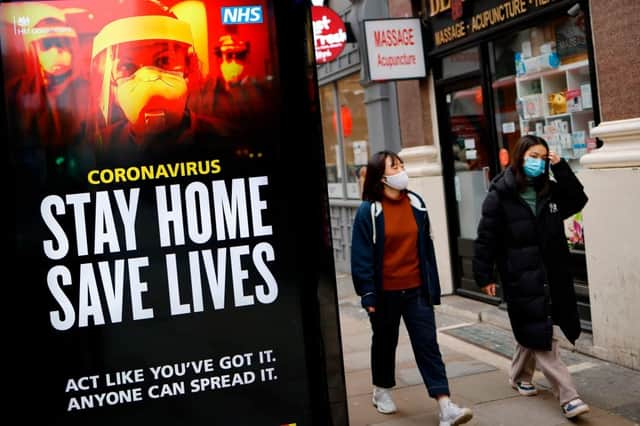People fully vaccinated against Covid may still have to self-isolate after 21 June


People who are fully vaccinated against Covid-19 will reportedly still have to follow self-isolation rules after 21 June.
It is expected that the 10-day quarantine period for those who come into contact with positive cases will remain after lockdown ends next month, even if people have received both doses of a vaccine.
Advertisement
Hide AdAdvertisement
Hide AdThis could mean that the nearly 23 million people who are already fully vaccinated could be forced to isolate for 10 days if contacted by the NHS - and a negative Covid test will not be allowed to end quarantine early, according to the Daily Telegraph.
If the quarantine rule does remain after 21 June, it could deter people from visiting crowded places to avoid the risk of having to quarantine, while workplaces may be reluctant to allow vaccinated and unvaccinated employees to mix in the same space.
By comparison, people who are fully vaccinated in the US are only required to self-isolate after coming into contact with someone who has coronavirus if they show any symptoms.
Review of social distancing rules
The UK government has pushed back a review into social distancing until next week while it assesses the data on the Indian variant.
Advertisement
Hide AdAdvertisement
Hide AdPrime Minister Boris Johnson has said he wants all the data possible before making a final decision about scrapping the ‘one metre-plus’ social distancing rule, and if face masks will no longer be needed after 21 June.
Government sources have reportedly argued that contact tracing should remain in place, as it is still possible to catch coronavirus, and spread it to others, even after having both doses of the vaccine.
Sources have also said there has been no indication a significant change to the rules on social distancing measures is coming, with many expecting guidance to remain beyond the last stage of the lockdown roadmap.
Work and Pensions Secretary Therese Coffey said on Tuesday (25 May) that she was “not aware of the basis” of the reports that fully vaccinated people will still be told to self isolate if they come into contact with positive cases after 21 June, adding it is still “too early” to speculate about the possible changes next month.
Advertisement
Hide AdAdvertisement
Hide AdSpeaking to LBC radio, Ms Coffey said: “I’m not aware of the basis of that particular information but, as has been said all along, we will keep working through all the data that has come in from right across the country to understand how we reduce the transmission of this (Indian) variant.
“I think it is too early to get into speculation about what will be happening with the social distancing and other elements from what we hope will still be June 21.
“We know that the virus and variants will continue to be a factor and an element of life in this country and within the world.
“That’s why the success of the vaccination programme so far is really important in trying to tackle the impact coronavirus can have, but also we are still trying to build the data and understanding the data and what happens with transmissions and how we are tackling new variants.”
Advertisement
Hide AdAdvertisement
Hide AdCovid vaccines effective against Indian variant
The debate over possible changes to guidance next month comes after tests proved that both the Pfizer and AstraZeneca Covid vaccines are both effective against the Indian variant.
A Public Health England (PHE) study found both jabs provide a high level of protection after two doses, with the Pfizer vaccine found to be 88 per cent effective against symptomatic disease from the Indian strain two weeks after the second dose.
This compares to 93 per cent effectiveness against the Kent Covid strain.
The AstraZeneca vaccine proved to be 60 per cent effective against symptomatic disease from the Indian strain three weeks after the second dose, compared to 50 per cent effectiveness against the Kent strain over the same period.
Advertisement
Hide AdAdvertisement
Hide AdHealth Secretary Matt Hancock described the outcome as “groundbreaking”, while PHE said it expects to see even higher levels of effectiveness against hospital admission and death.
Dr Mary Ramsay, head of immunisation at PHE, said: “This study provides reassurance that two doses of either vaccine offer high levels of protection against symptomatic disease from the B1617.2 variant.
“We expect the vaccines to be even more effective at preventing hospitalisation and death, so it is vital to get both doses to gain maximum protection against all existing and emerging variants.”
The findings provide fresh hope that the final stage of lifting restrictions next month can go ahead as planned, after the Indian variant cast doubt on the lockdown roadmap.